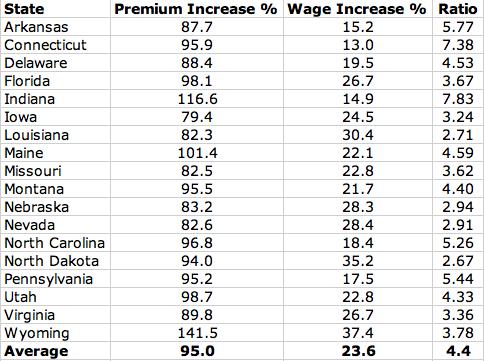(11 am. – promoted by ek hornbeck)
The non-profit, non-partisan group Families USA has begun releasing state-by-state reports comparing the rise in health insurance premiums against the rise of wages from 2000 to 2009. So far 18 state reports have been released, with the remaining states coming over the next few weeks.
Copies of reports for each state, in pdf format, can be found here.
The reports specifically look at premiums for families, and compare the increase in those family premiums with the rise in median income. And, surprise surprise, health insurance rates have skyrocketed compared to average wage increases. On average, for the 18 states reported on so far, family premiums increased 4.4 times as much as median wages between 2000 and 2009. The following is a spreadsheet I put together to summarize the results of each report:
[ratio is how many times faster premiums have risen compared to wages]
As has been pointed out briefly, though not nearly enough, by the president, the average worker who gets health insurance through their employer might not realize that the skyrocketing costs of insurance are having an effect on them because they think, “Oh, well who cares? I’m paid for.” Yet that same worker has not seen the kinds of raises that they would have otherwise earned without their employer having to continually front more and more money for health care.
Additionally, many workers have seen their co-pays and deductibles rise with the perpetual increase in premium costs, and still others have had the comprehensiveness of their plan reduced in order for their employer to be able to afford the coverage.
It should be fairly obvious that this trend is nowhere near sustainable. The American small business owner is going to find it near impossible in coming years to provide health coverage to their employees, if they already don’t. And America’s larger employers are not going to be as competitive in the marketplace as foreign firms because of the incredibly high cost of providing health insurance to their employees.
Beyond the already widely made arguments for a public option (choice), those who are currently covered by their employer should realize the benefits a public plan will have to their own future, and the future their children and grandchildren:
1) Increased wages as businesses become more profitable.
2) The ability of small businesses to provide for their people.
3) Increased competitiveness of American businesses in the global marketplace.
4) Consistently comprehensive coverage provided by their employer, with low deductibles and co-pays.
It is imperative to the prosperity of the American economy as a whole, and to the average American worker, that a public option (choice) be introduced to make businesses more competitive and to provide a better livelihood for employees. Without a public plan our economy is going to continue to suffer in the long-run under the weight of a gigantic health care burden.


2 comments
Author
Num num num.
those wage increase percent figures.
http://www.stevequayle.com/dea…